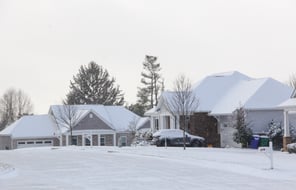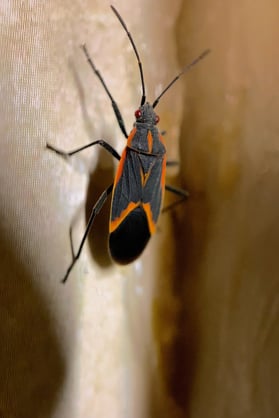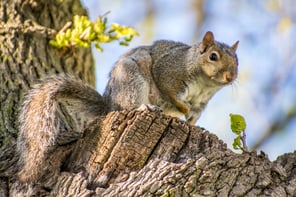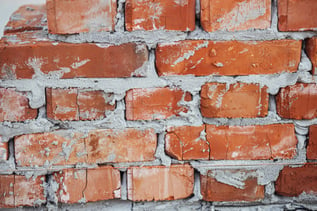Overwintering.
It’s a term pest control professionals frequently mention this time of year, but what does it mean? As a homeowner, overwintering is a crucial term for you to know and understand. Dr. Jim Fredericks, chief entomologist for the National Pest Management Association, describes overwintering as the act of bugs, spiders and rodents riding out the winter and doing things that help them survive cold temperatures such as entering homes for food and shelter. In layman’s terms, overwintering means pests will seek out the warmth and comfort of your home as temperatures begin to drop. Follow along as we discuss more about the overwintering process, what kind of pests overwinter, and what it means for you as a homeowner.

What happens when pests overwinter?
Overwintering is a pretty simple process for pests. As the weather begins to cool in your area, bugs and rodents begin seeking out the perfect winter vacation home to wait out the cold. While some (depending on geographical location) opt for burrowing in the soil, mulch, or even leaves, many see opportunity in your consistently warm and cozy residence. Unfortunately, your home may be the preferred option for creatures looking to survive the chilly winter months. As temperatures drop, these critters will make their way into your home through a variety of entry points: gaps or cracks in your foundation, poorly sealed windows or doors, holes in a home’s exterior, gaps under garage doors, outside vents, or through attics and basements.
In many cases, you probably won’t even know you have pests overwintering in your home. During their overwintering period, many pests lay low and don’t make themselves well-known. Exceptions to this include rodents who have periodic spikes in activity that typically occur at night when human activity dies down. (More on this here!) Rodents residing inside someone’s home perceive the homeowners as a threat and will keep quiet during the day when we are up and about. This is one of the reasons that homeowners will report increased activity - sightings or sounds - as it approaches our “bedtime.”
It should be noted that rodents also differ from other overwintering pests because they are considered to be a year-round concern. Rodents inside your home can be an issue at any point during the year, but many homeowners report an influx of unwelcome residents during the fall and winter. Like other pests, rodents don’t particularly enjoy the cold, so we recommend homeowners be especially alert to potential rodent activity as fall approaches.

What kinds of bugs overwinter?
It may surprise you to learn that not all insects overwinter. Different kinds of bugs deal with the cold in various ways: some simply freeze (but don’t die!) and wait to thaw out in the spring, while others die off, leaving eggs behind to hatch and welcome the next generation come spring. A few particularly hardy insects carry on life as usual, and others burrow underground to find warmth in insulation in the earth. Then there are the insects who opt for an all-expenses paid winter vacation in your home – so which ones do we have to look out for?
Some insects that overwinter indoors include:
- Boxelder Bugs
- Cluster Flies
- Ladybugs
- Kudzu Bugs
- Brown Marmorated Stink Bugs
- Ants
- Elm Leaf Beetles
- Silverfish
- Cockroaches
- Spiders
- Asian Lady Beetles
While this is far from an exhaustive list, these bugs are common overwintering pests within the United States.
 Boxelder
Boxelder
What kinds of rodents overwinter?
As previously mentioned, rodents are considered a year-round concern and can infest your home anytime during the year. That said, they tend to become especially troublesome when the weather becomes particularly frigid. While it’s a common misconception that rodents hibernate through the winter, these mammals remain active all year but do conserve energy in chillier temps by reducing general activity. Activity for rodents in the wild is significantly reduced as they attempt to manage their energy needs, but for those who have taken up residence in your home, they will remain fairly active regardless of outdoor temperatures.
Some rodents that overwinter indoors include:
- Eastern Gray Squirrel
- Red Squirrels
- Western Gray Squirrel
- Deer Mouse
- House Mouse
- Norway Rats
- Roof Rats
- Eastern Chipmunks

How can I prevent pests from entering my home?
Now that you’re aware of the broad variety of pests that may be eyeing up your home this winter, you may be wondering how to prevent them from gaining entry. When it comes to maintaining a pest-free home this cold-weather season, prevention is always the best line of defense. Unfortunately, preventing insects and rodents alike from entering your home is easy in theory but difficult in execution.
It stands to reason why minuscule insects may be challenging to prevent, but don’t underestimate a rodent’s ability to enter your home. You may believe that there are no holes large enough for mice to enter your home through, but this is likely, not true. A mouse’s body is remarkably pliable and capable of squeezing in ways a human can't. Mice have flexible bodies that can slip through cracks as small as a quarter of an inch wide – that’s about the width of a pencil! Even rats, considerably larger than mice, can slip through entry points as small as a half inch in diameter.
Though squirrels and chipmunks require larger gaps to enter through, they have the advantage of entering through the upper levels of the home, where it can be difficult to catch cracks or holes. Areas like where the roof and soffits meet are a common point of entry for squirrels and chipmunks. In homes that are two stories or more, it can be especially hard to identify and close every potential access point. For this reason, preventing even larger rodents like squirrels and chipmunks can prove problematic.
That said, there are a few ways to shore up your home to prevent insects or rodents from coming into your home this winter.
- Repair damaged door and window screens.
- Install door sweeps to prevent any gapping.
- Store firewood away from the home.
- Keep landscaping trimmed back and away from the home.
- Seal visible cracks, gaps, holes, or crevices (especially where pipes or utilities enter the home) with caulk, concrete, or metal.
- Replace failing weather-stripping around your home’s foundation and windows.
- Ensure all basements, attics, and crawl spaces are dry and well ventilated.
- Remove or seal food sources such as grain, birdseed, grass seed, or pet food from in or around your house, including your garage.
- Contact a reputable pest control company to treat areas with a safe insecticide barrier.

What should I do if I experience an overwintering infestation?
In the event that your prevention measures fail, we recommend contacting a trusted pest professional immediately. Especially in the cases of rodent infestations, the potential damage to your home is not worth the risk of DIY solutions. Rodents can cause severe structural damage to homes through their incessant chewing, nest-building, and defecation – not to mention ruin prized or sentimental personal items. Contacting a professional immediately is crucial during rodent infestations as they also reproduce at startling rates.
EcoShield's exclusion services are an effective solution to eliminate rodents by removing and treating existing infestations and by also sealing and repairing entry points to prevent them from continuing to enter your home.
Our Home Shield Protection Plan also offers four-season protection from pests, including those overwintering in your home. EcoShield’s pest solutions are botanically-based and 100% guaranteed effective – if the pests come back, so do we!
If you are experiencing problems with pests in your home this fall and winter, give EcoShield a call or fill out the form at the bottom of this page. Our experts are ready to help remove problem pests and ensure your home stays pest-free all winter long.